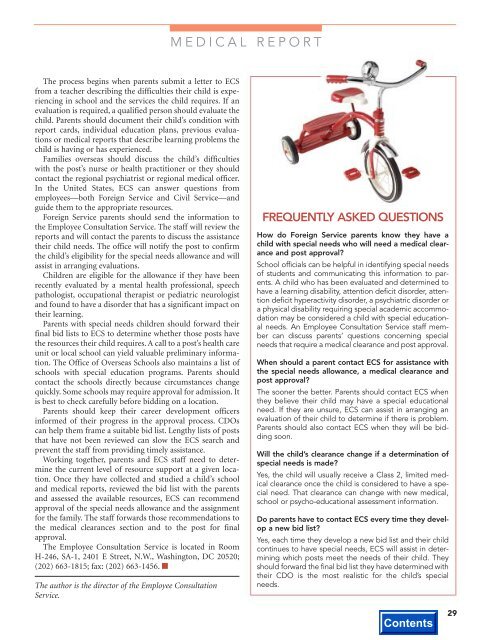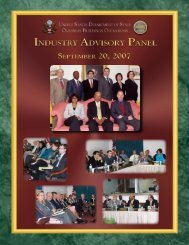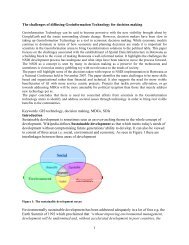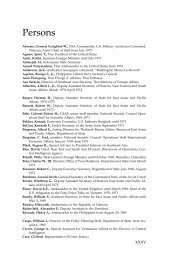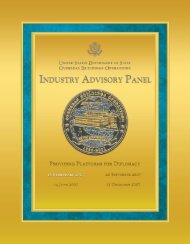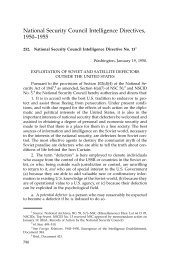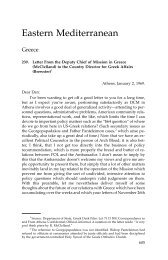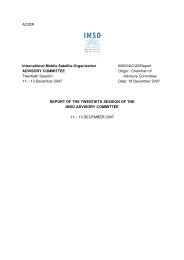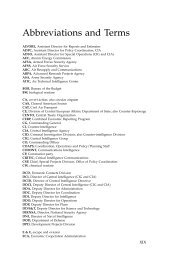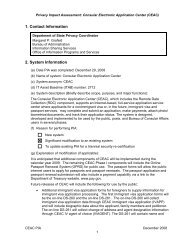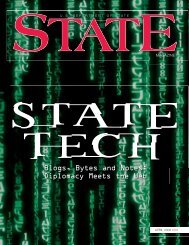about RNet - US Department of State
about RNet - US Department of State
about RNet - US Department of State
You also want an ePaper? Increase the reach of your titles
YUMPU automatically turns print PDFs into web optimized ePapers that Google loves.
The process begins when parents submit a letter to ECS<br />
from a teacher describing the difficulties their child is experiencing<br />
in school and the services the child requires. If an<br />
evaluation is required, a qualified person should evaluate the<br />
child. Parents should document their child’s condition with<br />
report cards, individual education plans, previous evaluations<br />
or medical reports that describe learning problems the<br />
child is having or has experienced.<br />
Families overseas should discuss the child’s difficulties<br />
with the post’s nurse or health practitioner or they should<br />
contact the regional psychiatrist or regional medical <strong>of</strong>ficer.<br />
In the United <strong>State</strong>s, ECS can answer questions from<br />
employees—both Foreign Service and Civil Service—and<br />
guide them to the appropriate resources.<br />
Foreign Service parents should send the information to<br />
the Employee Consultation Service. The staff will review the<br />
reports and will contact the parents to discuss the assistance<br />
their child needs. The <strong>of</strong>fice will notify the post to confirm<br />
the child’s eligibility for the special needs allowance and will<br />
assist in arranging evaluations.<br />
Children are eligible for the allowance if they have been<br />
recently evaluated by a mental health pr<strong>of</strong>essional, speech<br />
pathologist, occupational therapist or pediatric neurologist<br />
and found to have a disorder that has a significant impact on<br />
their learning.<br />
Parents with special needs children should forward their<br />
final bid lists to ECS to determine whether those posts have<br />
the resources their child requires. A call to a post’s health care<br />
unit or local school can yield valuable preliminary information.<br />
The Office <strong>of</strong> Overseas Schools also maintains a list <strong>of</strong><br />
schools with special education programs. Parents should<br />
contact the schools directly because circumstances change<br />
quickly. Some schools may require approval for admission. It<br />
is best to check carefully before bidding on a location.<br />
Parents should keep their career development <strong>of</strong>ficers<br />
informed <strong>of</strong> their progress in the approval process. CDOs<br />
can help them frame a suitable bid list. Lengthy lists <strong>of</strong> posts<br />
that have not been reviewed can slow the ECS search and<br />
prevent the staff from providing timely assistance.<br />
Working together, parents and ECS staff need to determine<br />
the current level <strong>of</strong> resource support at a given location.<br />
Once they have collected and studied a child’s school<br />
and medical reports, reviewed the bid list with the parents<br />
and assessed the available resources, ECS can recommend<br />
approval <strong>of</strong> the special needs allowance and the assignment<br />
for the family. The staff forwards those recommendations to<br />
the medical clearances section and to the post for final<br />
approval.<br />
The Employee Consultation Service is located in Room<br />
H-246, SA-1, 2401 E Street, N.W., Washington, DC 20520;<br />
(202) 663-1815; fax: (202) 663-1456. ■<br />
The author is the director <strong>of</strong> the Employee Consultation<br />
Service.<br />
MEDICAL REPORT<br />
FREQUENTLY ASKED QUESTIONS<br />
How do Foreign Service parents know they have a<br />
child with special needs who will need a medical clearance<br />
and post approval?<br />
School <strong>of</strong>ficials can be helpful in identifying special needs<br />
<strong>of</strong> students and communicating this information to parents.<br />
A child who has been evaluated and determined to<br />
have a learning disability, attention deficit disorder, attention<br />
deficit hyperactivity disorder, a psychiatric disorder or<br />
a physical disability requiring special academic accommodation<br />
may be considered a child with special educational<br />
needs. An Employee Consultation Service staff member<br />
can discuss parents’ questions concerning special<br />
needs that require a medical clearance and post approval.<br />
When should a parent contact ECS for assistance with<br />
the special needs allowance, a medical clearance and<br />
post approval?<br />
The sooner the better. Parents should contact ECS when<br />
they believe their child may have a special educational<br />
need. If they are unsure, ECS can assist in arranging an<br />
evaluation <strong>of</strong> their child to determine if there is problem.<br />
Parents should also contact ECS when they will be bidding<br />
soon.<br />
Will the child’s clearance change if a determination <strong>of</strong><br />
special needs is made?<br />
Yes, the child will usually receive a Class 2, limited medical<br />
clearance once the child is considered to have a special<br />
need. That clearance can change with new medical,<br />
school or psycho-educational assessment information.<br />
Do parents have to contact ECS every time they develop<br />
a new bid list?<br />
Yes, each time they develop a new bid list and their child<br />
continues to have special needs, ECS will assist in determining<br />
which posts meet the needs <strong>of</strong> their child. They<br />
should forward the final bid list they have determined with<br />
their CDO is the most realistic for the child’s special<br />
needs.<br />
APRIL 2005<br />
29


